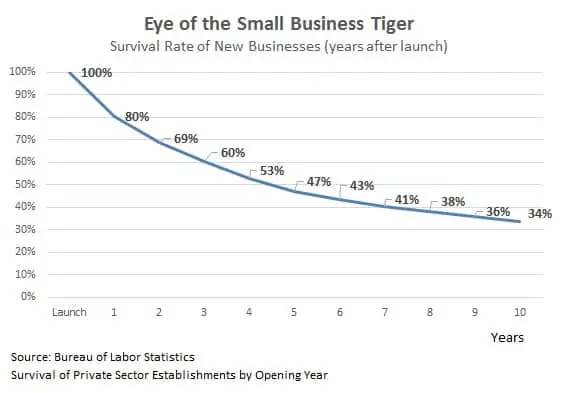The Small Business Administration reports the major reasons why small businesses fail and what you can do to be successful
Small business failure statistics are too often used as a way to scare someone out of following their dreams. The second you share your idea for your entrepreneurial dream, someone quotes some number they read from who knows where to warn you…before telling you to go for it and wishing you luck.
Is it 9 out of 10 small businesses that fail? Is it thirty or forty percent?
The fact is that many of the small business statistics you’ll hear are just pulled from someone’s…lower region.
That doesn’t mean it’s easy launching a successful small business. The U.S. Bureau of Labor Statistics (BLS) reports that only half of new establishments (new businesses) survive five years or more and only a third are left after 10 years.
Let’s look at some of the reasons small businesses fail, and more importantly what you can do to not just survive but to thrive!
How Many Small Businesses Fail, Really?
The graphic shows the survival rate of small businesses from the BLS data. If you think about the data applying to 10 new businesses, then eight would be left after the first year and about three or four after the tenth year.
While it’s not the 9 out of 10 statistic you hear all too often, it’s still tough to think that only half of the entrepreneurs are left after five years.
Biggest Reasons Why Small Businesses Fail
The U.S. Small Business Administration ran a list of why small businesses fail. They’ve since taken it down but I added the list here along with a few other reasons and how you can fight the trend to realize your dreams.
- Lack of Experience – I’ve worked with a lot of startups as an early-stage investor and can vouch for this one. Spend at least a few years working for someone else in the industry. Read up on the industry and follow trends through a business group. You’ll not only excel at your job but you’ll know the business inside and out when you start your own company.
This goes for traditional offline businesses as well as new online businesses. Spend some time working and really getting to know the business before you jump in with your small business idea.
- Insufficient Capital – How much will you need to start you own business? This includes not only enough to run the business, i.e. marketing and production, but also how much you need for living expenses while the business gets going.
- Poor Location – There’s always a tradeoff between costs and potential when deciding on a location for your business. You can pay a fortune to put it on the busiest corner in the city or you can get your location for a steal if you put it down some dark alley. Understand how to estimate foot traffic and compare it across different location rents.
- Poor Inventory Management – Inventory takes space and space costs money. With many traditional retailers struggling, lean is the name of the game. You have to be able to estimate how much product you’ll need to satisfy demand but not so much that it gets old and takes up space.
- Over-Investment in Fixed Assets – Do you really need that huge warehouse or machine? It’s always best to go lean when starting a business. Buy only the essentials for property, plant and equipment. Save your money for the things that will drive sales like marketing and development.
- Personal Use of Business Funds – You have to reinvest in your business or you can’t expect it to grow…or survive. I know business owners that put 50% to 80% of their profits back into the company. I usually budget around 30% but new businesses may have to put everything back into growth for at least a few years.
- Poor Credit – Unless you have an unlimited source of funds, it’s always good to have a little credit available. If your personal credit isn’t so good right now, use the next couple of years to improve your credit score so you’ll have available capital for your business.
- Unexpected Growth – Some businesses are just too successful, can you believe it? It’s sad but I’ve seen small businesses fail because they got too many orders and lost customers because of poor planning. Have multiple plans for producing your product, a base case scenario and what you’ll do if you have to ramp up quickly.
- Competition – I don’t buy this one. If there’s no competition for your business idea, maybe there’s not much of a market for it. There will always be competition for a good business idea, your job is to figure out how to serve the market better than anyone else.
The problem in looking at the numbers is that they don’t apply to you! If you go into launching your small business, comparing yourself with the average business, then you are bound to fail.
Who wants to be average? Look at what the success stories are doing in your industry and compare yourself to them. Understand the reasons small businesses fail and plan to tackle each reason within your business plan. Don’t give up and you’ll beat the odds for small business success!


